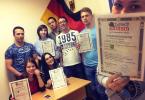This time we will tell you where in Moscow you can learn German, hone your speaking skills, communicate with like-minded people and native speakers, play games, watch movies and discuss a variety of topics in German. And most importantly - all this is free or very cheap!
Franco-German circle in the Library-Reading Room named after I. S. Turgenev has been conducting German language classes for many years, aimed at maintaining and improving the level of language proficiency, speaking and reading skills. There are also meetings dedicated to reading classical literature in the original language.
When: Please check the class schedule by phone.
Where: Library-reading room named after I. S. Turgenev (metro Chistye Prudy/Turgenevskaya, Bobrov lane, 6, building 1,2).
Price: for free. There is an annual membership fee of 500 rubles.
Note: Students are recruited before the start of the new academic year based on testing.
Russian-German house in Moscow. It is a German cultural center offering, among other things, free German language courses. First of all, ethnic Germans living in Russia and wishing to learn German are invited to attend classes. For all others there is a quota of 10%. To become a student of language courses, you must fill out an application on the RND website.
When: twice a week (schedule to be confirmed).
Where: st. Malaya Pirogovskaya, 5 (metro station Frunzenskaya).
Price: for free.
On this topic:
Libertat Linguistic Lecture Hall . German classes are designed for students with different levels of language proficiency. You can join groups at any time. To attend a class, you need to sign up on the Lecture Hall page on social networks. There you can also find an interactive schedule and educational materials on which lessons are taught.
When: for beginners - Wednesday from 18 to 20 hours, for intermediate - Monday, Wednesday from 19 to 21 hours, Saturday - from 11 to 14 hours
Where: for beginners – Hostel “Privet” (metro Kurskaya, Podsosensky lane, 3, building 2), bookstore of the magazine “Moscow”; for those who continue - Knizhny (Arbat St., 20), on Saturdays - Library No. 187 named after. Pablo Neruda (metro station VDNKh, Mira Avenue, 180).
Price: for beginners – free, for intermediate – 200 rubles.
Note: You can get information about groups and levels, enroll in a group and find out the current schedule and location of classes on the official page of the Lecture Hall on social networks.
Conversation clubMERGE . Every week, club members gather in a coffee shop to talk, discuss current and interesting topics, get to know each other and play board games in German. Communication time is not limited.
When: Saturday from 19:00.
Where: Starbucks coffee shop on Paveletskaya (metro Paveletskaya, Kozhevnicheskaya st., 1).
Price: 200 rub.
Conversation Club ESPlaneta Every week he holds language meetings with a native speaker for students of German. The program includes games for conversation practice, discussion, and acquaintance.
When: on Sundays.
Where: Starbucks coffee shop on Serpukhovskaya (metro station Serpukhovskaya, Stremyanny lane, 38/3)
Price: 200 rub.
The leader of the rating was the Master Class school (Novokuznetskaya metro station), which scored 9 points out of 10. The school employs some of the best German teachers in Moscow, and has developed a unique testing system. The main training is conducted in groups, but individual courses are also offered, taking into account the characteristics and wishes of each student.
Next in the ranking of German language schools in the capital is the foreign language center "Star Talk", also with 9 points. More than 14 thousand students have successfully completed their studies at this school. "Star Talk" pleases students not only with the quality of education, but also gives gifts, for example, a foreign trip to a language course in Malta.
Rounding out the top three was another branch of the Master Class school, located near the Kashirskaya metro station. Now German can be studied not only in the center, but also in the south of Moscow.
German language courses in Moscow: rating, reviews, cost comparison, discounted prices
German is the official language of Germany and Austria and one of the three official languages of Switzerland. German belongs to the West Germanic group of the Indo-European language family.
The recorded history of Germanic languages begins with the speakers' first contact with the Romans in the 1st century BC. At that time, and for several centuries thereafter, there was only one “Germanic” language, with minor dialectal differences. Only after about the 6th century AD can we speak of a German language.
Overall, German is the mother tongue of more than 90 million speakers, has the sixth largest number of speakers in the world, and is one of the major cultural languages of the Western world.
Studying the German language provides advantages in many areas, for example for studying or working in Germany or Austria, communicating with friends or colleagues from German-speaking countries, improving your level of German and reaching a qualitatively different level of knowledge of the German language that is not available when studying in regular courses.
German language schools in Moscow, presented on our website, in addition to preparing for international exams, offer the following types of training:
Intensive German course
. Spoken German
. German courses with native speaker
. Business German Course
. German courses for children and teenagers
. German via Skype
Teachers of many Moscow schools presented on the website have international certificates that grant the right to engage in teaching activities.
German is quite homogeneous; it is no more different in Germany, Austria and Switzerland than written English is in the USA and the British Commonwealth. As a spoken language, German exists in many dialects, most of which belong to one of the dialect groups. The main difference between High and Low German is the consonant-based sound system.
If you successfully pass the German language exam, you will receive a special diploma confirming your level of knowledge of the German language. This is important when applying to universities in Germany, Austria, Switzerland or Liechtenstein, and may also be a prerequisite for obtaining a job in the above countries.
The most common and in demand are the following German language exams.
Zertifikat Deutsch assumes that you are able to communicate in everyday life, read newspapers, correspond by e-mail, actively communicate, put forward ideas.
Zentrale Mittelstufenprüfung assumes that you can read and understand complex texts, scientific journals and instructions, as well as be able to actively and quickly express your opinions and join in all kinds of discussions, including in school and work.
Zentrale Oberstufenprüfung means understanding any text, the ability to formulate an idea based on differentiated primary sources and the ability to communicate with an almost perfect understanding of the interlocutor.
The Kleines Deutsches Sprachdiplom indicates that you read complex non-adapted texts, have a high level of spoken and written German, and have an excellent understanding of German culture, science, and social life.
Großes Deutsches Sprachdiplom assumes knowledge of German at the level of a native speaker. Just like the KDS, the GDS exempts you from the entrance language exam to German universities. In some German-speaking countries, the GDS even gives you the right to teach German.
Find the German language courses that suit you on our website and learn German at prices cheaper than calling a German school directly.
With this article you can easily talk or write about your school in German.
Questions on the topic "School":
Wo liegt sie? -Where is it?
Wie ist sie? -What is she like?
Welche Räume gibt es hier? - What kind of offices are there?
Wo liegen diese Räume? - Where are these offices located?
Wie kann sie sein? -What could she be like?
Welche Schulfächer gibt es in der 6. Class? - How many subjects are there in 6th grade?
Und in der 7. Class? - And in the 7th?
Was nehmen die Kinder in die Schule mit? - What do children take with them to school?
Welchen Stundenplan wünschen sich einige Kinder? - What kind of schedule do some children want to have?
Story about school in German:
Das Gebäude meiner Schule liegt in der ____ Straße, das ist ein zweistöckiges Gebäude.
My school is located on _____ street. This is a two-story house.
Vor dem Schulgebäude befindet sich ein Schulhof. Da gibt es einen großen Sportplatz. Auf diesem Sportplatz können die Schüler während der Pausen und nach dem Unterricht spielen und Sport treiben.
In front of the school there is a school yard. There is a large sports ground. On this sports ground, students can play or exercise during breaks and after classes.
Durch die breite Eingangstür kommt man in die Vorhalle. Hier ist die Garderobe. Im Erdgeschoss befindet sich das Schuldirektorskabinett, die Bibliothek, die Speisehalle, der Sportsaal und das Artzkabinett. Im Erdgeschoss sind auch Klassenzimmer. Hier lernen die Schüler der ersten-dritten Klassen.
Wide entrance doors lead to the lobby. This is where the wardrobe is located. On the ground floor there is the director's office, a library, a dining room, a gym and a doctor's office. There are also classrooms where first to third grade students study.
Im ersten Stock befindet sich das Lehrerzimmer und viele verschiedene Klassenzimmer. Das sind Physik-, Mathematik-, Chemie-, Geschichte-, Biologie- und Fremdsprachenkabinette.
On the second floor there is a teacher's room and many different classrooms: physics, mathematics, chemistry, history, biology and foreign languages.
Alle Klassenzimmersind groß, hell und gemütlich. Sie sind immer sauber. In den Klassenzimmern stehen Tische, Stühle, Bücherschränke. In jedem Kabinett hängt natürlich eine breite Tafel.
All offices are bright, large and cozy. They are always cleaned. The classrooms have tables, chairs, and bookcases. There is a wide board hanging in each office.
Meine Schule hat gute Traditionen. Die Schulabende, Sportfeiertage, verschiedene Treffen sind immer sehr interessant.
My school has good traditions. School evenings, sports festivals and various meetings are always very interesting.
Modern German language training programs will help you master written and speaking skills in just 2 months. After just six months of classes with a teacher, you will be able to pass an international exam and confirm a high level of knowledge. German language courses in Moscow, St. Petersburg and other cities without cramming and boring lectures - this is possible at ALIBRA SCHOOL. We provide the opportunity to attend an open lesson for free before enrolling in a German language course.
Why German
- Large European companies use it as a language of business communication.
- German is the official language in 6 countries and spoken in 36 countries.
- Learning German is required by many people working in the tourism industry.
- Germany actively funds scientific development, so the language is the second language for science after English.
- The masterpieces of world classical literature are written in German, and even a professional translation cannot replace reading them in the original.
Our courses
- For beginners. If you have never taken German lessons, we will help you understand the basics of grammar and increase your vocabulary in a short time. You will be able to independently communicate in a foreign language with other students in the group within two months after the start of classes. German language courses are conducted according to ALIBRA’s own teaching methodology.
- Business German Businessdeutsch. Learning German for those who already have intermediate level knowledge and above. Classes are held twice a week. German language courses provide material to increase vocabulary; those who wish can improve their speaking skills to an almost professional level.
- Conversation courses. Our school of German and other foreign languages in Moscow has developed a special communication program. It will help you establish communication with interlocutors and business partners from Germany, and make your speech beautiful and competent.
- Preparation for passing the international exam. German language courses in our center will help you pass the Goethe-Zertifikat, B2TestDaF, Zertifikat Deutsch für Jugendliche (ZDj), Fit in Deutsch 1 KID 1 TELC1 and Start Deutsch 1 exams. Preparation for the exams is carried out by teachers who have trained abroad and native speakers. The school is accredited by Cambridge English Language Assessment.
Our programs
- "NB0" - teaching German from scratch.
- "NB1" - courses for students with a school level of training.
- Express Deutsch - intensive study of German, including work on an individual program for those who are limited in time.
A unique approach to learning is the key to success
German courses can be easy and interesting. Receiving additional education does not mean sitting for hours at a textbook and memorizing complex grammar rules. It's never too late to start, and the secret to success lies in just a few ingredients.
- Unusual presentation. German language lessons for children and adults are based on unique programs and modern material that is interesting and educational for students.
- Real benefit. With us, everyone can choose German language courses that meet their specific goals. So, in speaking classes, speaking skills are developed, the ability to understand the words of an interlocutor spoken at a fast pace. Studying German in preparation for exams gives you great practice in writing specific tests. In business courses, you will master business vocabulary that will help you speak with partners without translators.
- Individual approach. You can work and attend German language courses according to one of the most convenient schedules. Seminars in mini-groups, individual lessons and remote lessons via Skype are available.
- Free access to the mobile application. A unique product, developed using the proprietary ALIBRA SCHOOL method, will help you quickly expand your vocabulary and learn 1800 German words without cramming, easily and forever.
What do you get
- German courses systematize the grammatical mess in your head. The most complex questions will become simple and understandable.
- You will be able to communicate with native speakers after just a few months of studying, even if you have never studied German before.
- You will learn to find opportunities for more interesting construction of conversational phrases, and you will be able to get away from the templates imposed by school textbooks.
- Learning German will provide a good experience of direct communication - all students and the teacher do not use Russian speech during classes.
ALIBRA SCHOOL teachers
Our school employs more than 300 highly qualified teachers. Many of them have international TOEFL and IELTS certificates and foreign internship experience. We also offer learning German with native speaking teachers who are qualified to teach foreign students. All of them undergo special training to work with ALIBRA SCHOOL proprietary programs.
Your future is in your hands! Educate yourself with ALIBRA SCHOOL
We are ready to select courses for you that meet your objectives and are suitable for your price. Study, work, travel around the world, communicate with friends and relatives in Germany - nothing is impossible, you just have to want it. Call us or come to any language center in St. Petersburg, Kazan, Yekaterinburg or Moscow.
Hello! My name is Denis Listvin. I am a candidate of philological sciences, associate professor at the Institute of Applied Linguistics of St. Petersburg State Polytechnic University. I am also the author of the now widely known textbooks “Modern German. Practical course for beginners" and "Complete German language course" (Moscow, "AST").
The situation in modern education is such that many language schools were created as purely commercial projects and often by people far from education, science and foreign languages themselves. A standard business plan was taken as a basis, standard textbooks were purchased, teachers were hired - and off we went! My school had a different story.
In 2005, while working at the Institute of Foreign Languages at the St. Petersburg University of Economics and Finance (Finek), I began developing my own textbooks on the German language for beginners.
In 2009, I was offered to teach German language courses at the Faculty of Foreign Languages of the Polytechnic University, where, according to my program, in 3 years I created a successfully functioning German department from scratch. In parallel with this, there was a constant development and testing of teaching aids.
In 2011, the country's largest publishing house, AST (Moscow), published my first textbook, Modern German. In 2015, a new book, “The Complete Course of German,” was published. Thousands of people in Russia and abroad are currently studying using these textbooks, both independently and in courses and specialized linguistic and philological departments of universities.
In 2012, having ten years of teaching experience behind me, I opened my own German language courses in St. Petersburg. I wanted to make them “typically German” - as orderly, systematic, compact and effective as possible - and these are the courses that I am pleased to offer today!

Methodology of our German language school
The technique answers the question: how? That is, it gives a clear idea of how best to perform a particular practical activity to achieve a previously known and desired result.
Our German language school works according to the original methodology developed by Denis Listvin. When creating it, the author pursued the goal of significantly making it easier for students to learn German and making an optimal ratio between the efforts students expend and the results obtained.
To solve this problem, the author needed to find the most effective teaching methods that would remove the difficulties that arise on the path of most students. At the same time, not just methods that facilitate the acquisition of foreign languages as such were taken into account. And there was a targeted search for methods of teaching German directly to Russian-speaking audiences.
A long and difficult search process culminated in the creation of a unique and extremely effective technique, the use of which always brings excellent results.
Today, our German language school offers courses of different types, but each of them is based on our own methodology, which sets our offers apart from a number of similar ones.
For this reason, studying in our courses is always interesting, easy and productive. And for those who want to learn German on their own, there is a wonderful tutorial compiled taking into account all the basic principles of our exclusive methodology.

Principle #1.
Highlighting the main thing
According to the famous Swedish linguist and polyglot Eric Gunnemark, only 40 of the most frequent words will cover approximately... 50%!!! what you want to say in everyday speech! 400 words will cover about 90%.
The main principle of polyglots at the initial stage of language learning is ECONOMY OF WORDS.
And this principle is consistently observed in our course, in which only the most necessary and high-frequency words and actually used grammar are offered for study. However, simply selecting good material is not everything! It is extremely important for learning to follow PRINCIPLE #2.

Principle #2.
Removing Interference
In the course of any activity, interference arises that interferes with the effective performance of the activity (in psychology, such interference is called interference).
A huge number of such completely meaningless interference can be found in any foreign language textbook. Rules, exceptions, cases, conjugations, tenses often fall “in one heap” and, no matter how hard they try, they don’t have time to assimilate.
The basis of language learning is the development of a skill, and for this it is extremely important to minimize such interference.
For example, figure skaters learning a new program do not strive to “skate” it immediately from beginning to end, but practice each element until it becomes automatic, combining them further into a whole program.
The principle of minimizing interference is consistently followed in our course. Various topics do not “pile up” on each other, but are studied separately and systematically, ensuring the development of solid skills and a complete understanding of the material being studied.

Principle #3.
Training
It is known that a person acquires 80-85% of knowledge in the course of practical activities. Therefore, the well-known call to “Study, study and study!” should rather sound: “Train, train and train!” Therefore, the third stage in the implementation of our method is training skills using a unique set of specially designed exercises that consolidate the skills being developed.
Advantages
The DeutschEffekt school program is based on many years of experience working with hundreds of people starting to learn German, and aims to minimize the difficulties along the way. Since our school is also a publishing center that produces its own educational materials, we have the opportunity to constantly and quickly improve the program, maintaining it at the most current level.

Uniqueness
Most language courses emphasize that they teach “using the most modern textbooks from leading Western publishers, created by native speakers.” Sounds nice. However, there is one problem: using these “most modern textbooks” it is very difficult to learn German.
The fact is that foreign publishing houses create carbon copy textbooks for all countries and peoples of the world without taking into account the characteristics of the students’ native language.
In addition, it is already well known that a native speaker most often does not understand how his native language is acquired by foreigners.
Therefore, we abandoned the use of fashionable foreign textbooks and created our own, unparalleled, author’s course and teaching aids.
The course is based on the principles of the world's leading polyglots, linguists and psychologists and takes into account the characteristics of the Russian-speaking audience. The course was created on the basis of many years of research and testing at the linguistic departments of famous universities (Finek, Polytechnic), during which over 1000 people completed the course program.
Simplicity
You may have already started learning German before, and it is possible that you encountered difficulties in doing so. Maybe you, like the famous writer Mark Twain, think the German language is too difficult.
Mark Twain believed that a person needs to spend at least 30 years studying German, and he proposed to establish thorough order in the German language itself and remove all unnecessary things.
And we did it! You will not feel any cumbersome grammar, and you will not learn “scientific” theory. Instead, with simple and effective training exercises, you will practice the skills you really need and constantly feel your progress.
We guarantee that at all stages of the DeutschEffekt course you will have a feeling of complete understanding of the material, and none of the proposed topics will cause you significant difficulties in mastering it.
Saving
A specially developed methodology and training program allow you to avoid unnecessary steps on the way to the goal, which means making the process more economical in time and money.
Thus, the bachelor's program in linguistics in German (as a second foreign language) using our materials can be mastered instead of 3 years in... 1.5 semesters! Of course, this is despite the rather large number of hours allocated to studying German in foreign language.
But even with only two classes per week, the bachelor’s program is mastered in 2 years instead of three! By the way, one lesson lasts two academic hours, and not three, as in many other courses, which again saves your time while fully maintaining the quality of training.
Taking into account the fact that in many courses each level is divided into two sublevels, the DeutschEffekt course allows you, in addition to time, to save up to 25,000 rubles at each level of training compared to other courses in St. Petersburg.
Quite typical German :)




